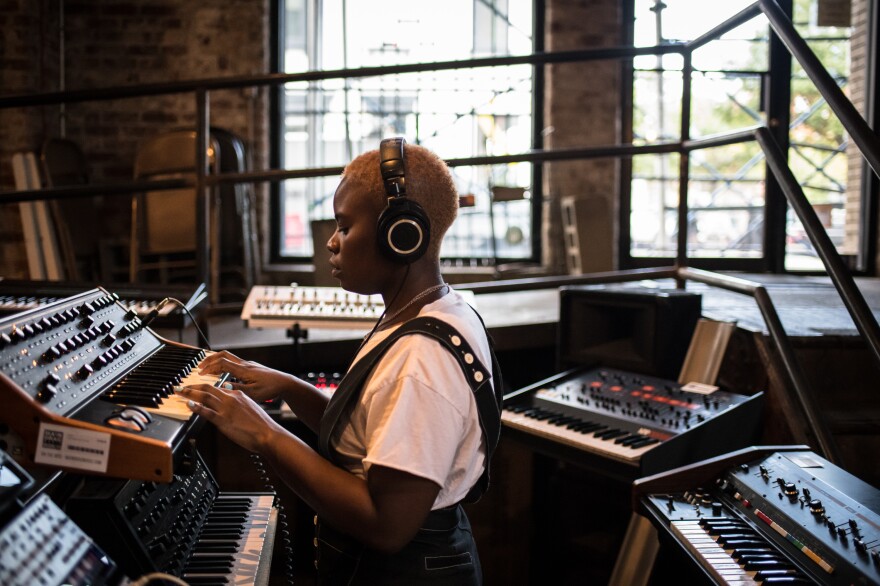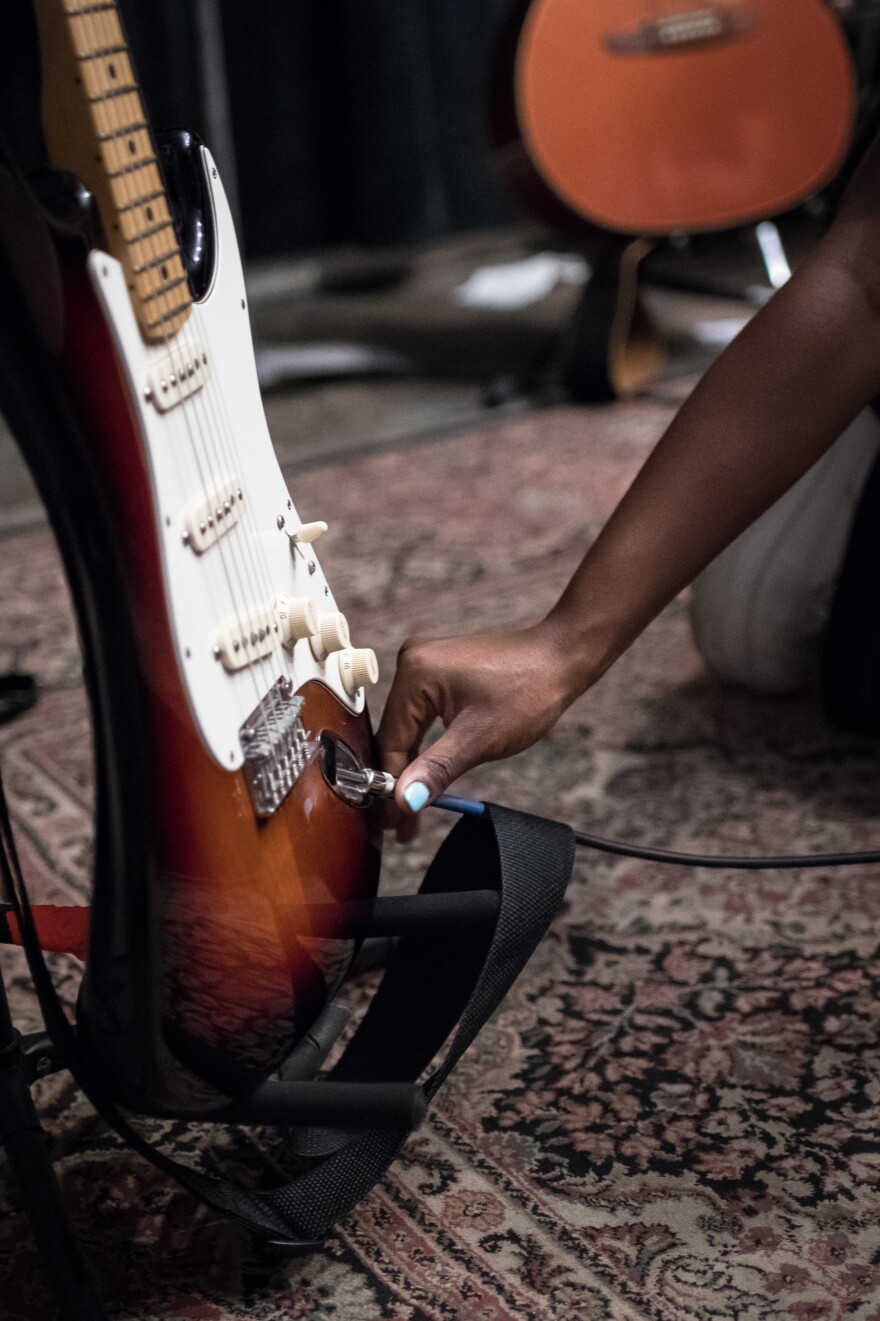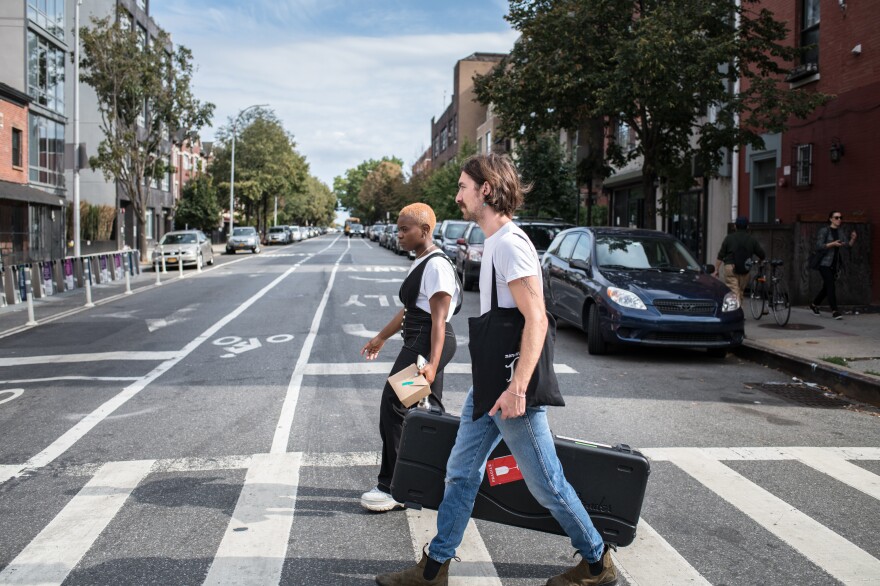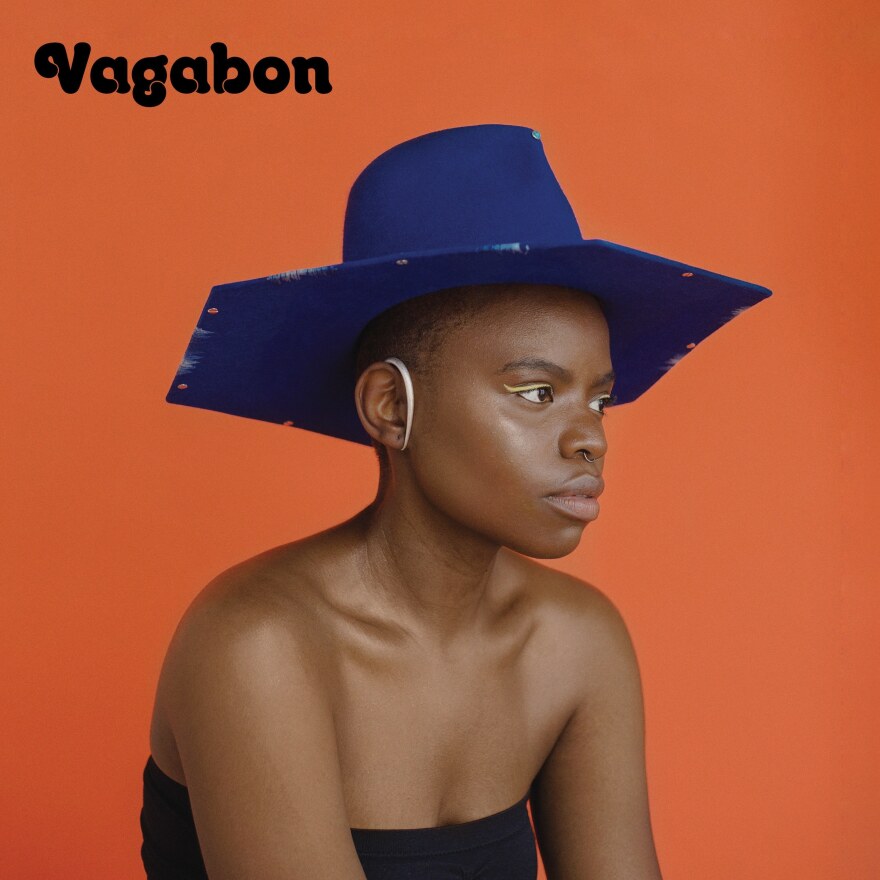"I'm naturally soft spoken," Laetitia Tamko says. "But when I sing, I'm not soft spoken."
Much of Infinite Worlds, the first album Tamko recorded as Vagabon, was her with a guitar, singing achingly introspective songs about the search for home and safety. Tamko says when she recorded it, she was uncomfortable with how deep her voice was. But now, hundreds of live performances later, she's embraced it.
She recalls stumbling across a tweet where someone said she sang like she had peanut butter stuck at the roof of her mouth. She gives a self-assured laugh; she thought the image was hilarious.
"I don't know if I'm breaking any singing rules, but to me it doesn't matter," Tamko says. "You know, it's my voice and it's deeply personal and I don't want it to be perfect."
Tamko's second album, the soon-to-be-released, self-titled Vagabon, is written from the perspective of someone who found not just the space to call home, but also a firm grip on her artistic identity, and with it, the luxury of being interested in what happens when carefully set boundaries dissolve. On the new album's "Every Woman," Tamko lets herself sink into the lowest part of her register to sing about generational exhaustion. On "Please Don't Leave the Table," Tamko floats a Destiny's Child reference in a relaxed falsetto: "When you call, say my name, say my name." She tries the folk singer, the popstar and the bedroom indie rocker all on for size.
Tamko is in the middle of a process she calls "the death of [her] imposter syndrome." But the phenomenon feels like it merits a more active phrasing. Tamko is quashing her self-doubt.
She's done with "walking into a space and wanting someone to feel like I'm non-threatening by making myself really, really small." She's also been removing a tendency to downplay the strength of her art.
"I feel like I made an amazing record." She pauses, exasperated. "Why can't I say that?"
***
We are arguably at our healthiest when we set boundaries; when we let a relationship or a project enrich our lives without completely consuming us. But it is also very human to be completely torn asunder.
The music of Vagabon is perfect if you want to get a little heady about this tension. What does it take to feel fully alive without getting eaten alive in the process?
Or, as Tamko puts it, "How do I deal with interpersonal relationships as a person ... whose comfort and safety can easily feel threatened?"
"I want to make you / A flood in my / Flood in my heart," Tamko sings on the bright and synthy "Flood." She first read the phrase "flood hands" in a book, though she can't remember which one. "It made me so emotional to read that because at that time I felt like I was so ... fragile, I could really seep through people's fingers."
"Flood" is about realizing that good can come out of our fragility. "It's the vulnerability that comes with putting down the barriers enough to let someone destroy you if that's what's going to happen," Tamko says. "And knowing that I could do that too, to someone else. I think because I've always felt victimized through my various traumas I didn't really see myself in that position — having that power."
"I came back around / Knowing you'd wreck my s*** all over again / It's funny how I'll never regret / Going low for you," she sings on "Secret Medicine." Here, Tamko, doesn't so much chide the relatable relationship boomerang as self-destructive, she just marks it as just something worth noting.
Tamko and reigning pop queen Ariana Grande make really different music, but Vagabon and thank u, next, Grande's 2019 album about love and loss, both succeed for one of the same reasons: It is refreshing to hear songs about deeply felt emotions, written from the perspective of a woman who is invested in not just being kind to others, but also kind to herself.
"I grew up with a lot of people who were not interested in being self-aware," Tamko says. "And I made this decision that I was going to be as self-aware as I could be, and really introspective, and really interested in how to be a better version of myself."
Tamko describes Vagabon as a flex: she plays many of the instruments you hear on it, and she learned the digital audio software Logic Pro so she could produce it almost entirely on her own (she is the sole producer credited on all but one song). She did not listen to music while writing it because she didn't want to drown out what was already in her head, and she wanted to make music she couldn't reference anywhere else. Nonesuch Records — home to a deep roster of musical veterans like Rhiannon Giddens, Philip Glass and Laurie Anderson — will release the album.
To get pumped up to go into the studio and record, Tamko re-opened herself to music from the outside, and listened to a kind of "game day" mix of artists, mostly female rappers: early Nicki Minaj, Lil Kim.
"My faves are not humble bragging," Tamko says. "They're humble in their actions, but they're not humble."
Tamko was born 26 years ago in Cameroon, but has lived in and around New York City since she was a pre-teen; she's part of the generation that saw hip-hop become pop. Inspired by the collage-like music of Frank Ocean, she found a way to cram all of the sounds that personally move her — pop, punk, trap, African music — into this recording.
Vagabon feels experimental, perhaps exactly because the person who made it was using tools that were new to her. In her short career, Vagabon has been associated with indie rock, but her new music relies on less on the guitar and more on synths, sequenced drums and strings. Vagabon doesn't necessarily "defy genre," to borrow an overwrought cliche, but wonders why genre even comes up when there's so much more to talk about.

***
Tamko can remember the first time she realized music made her feel better than anything else. She thinks she was about three. Her family was in the Cameroonian capital city of Yaoundé, where she was born and spent much of her childhood. It was a Sunday, at a gathering called a reunion, in a circle of about 25 women, singing together.
Tamko got right in the middle of that circle and she danced. An uncharacteristic behavior, perhaps, for a person who would describe herself as a shy kid. It was a feeling she would spend years chasing.
Tamko's family moved to the U.S. so that her mother could get a law degree. Before she could bring the rest of the family over to New York, Tamko's mother worked the counter at a Jamaican restaurant in Harlem (she eventually graduated from the University of Pennsylvania).
The family moved from Harlem to the Bronx, then to Westchester County, where Tamko attended high school. As a teenager, Tamko begged her parents, to no avail, for voice and guitar lessons.
Her parents eventually surprised her with an acoustic guitar when she was 17, just about to graduate. She remembers screaming when she found the instrument in the bathroom (still in its box from Costco) and then setting to work learning how to play it. She worked through the accompanying instructional DVD many times over and supplemented with UltimateGuitar and YouTube. During boring and lonely 12-hour shifts at her mother's parcel business on the weekends, she flipped on her webcam and played covers with her newest obsession.

Tamko had an understanding with her parents: the guitar was just to be a hobby, for the moments leftover after work, school and chores. She "adapted to that to make them feel more at ease," she says, but watching award shows on TV had given her lofty private goals.
"I'm going to write songs and make an album and win a Grammy one day," Tamko says, letting out a big laugh. "That was the dream!"
Tamko lived with her parents while she attended the engineering program at the City College of New York. She started writing songs towards the end of college, inspired by a classmate, and soon she was playing punk shows at night and driving up to the Hudson Valley on the weekends to record.
She released an EP, Persian Garden, on Bandcamp in 2014.
"I got a drummer from the jazz department at my college and a bassist that was recommended by him," Tamko says. She paid everyone. "Now that I think about it, from the beginning I was ... interested in cultivating my vision without feeling tied to other people's things."
She did this all without telling her parents, stealthily moving her guitar in and out of her car when they weren't around to see.
"My parents always said, 'There is no room for starving artists here. After you finish your degree, do whatever you want,'" Tamko says. "I don't believe they knew how seriously I would take that."
Tamko played a cross-country tour the summer after graduation. She told her parents that it was a trip to see the sights this country had to offer and that her friends would be playing music here and there.
After she got back from that trip, Tamko says, "for many reasons that feel a little too personal to share, it became unlivable in my parents' house." She left with a backpack of her belongings, believing she would never return.
"I think it's ... for some reason, a compelling story to see how a person like me has been hurt, or feels hurt, or feels damned or doomed," Tamko says. She gets visibly emotional as she recalls this time, but prefers to keep the details private. "And I think that's why a lot of times when I'm speaking to anybody in the media, I lead with black joy, because that feels more radical and productive to me than, 'Of course that s*** happened.'"
"I'm constantly thinking about 'no suffer porn, no suffer porn, no suffer porn ... that is not how I want to be talked about," she adds.
After she left her family, Tamko spent her days working as a software engineer in Long Island City, and spent her nights playing DIY shows in the insular and overwhelmingly white Brooklyn indie and punk scene.
"My family wasn't speaking to me, I'm in this transitional period of friends and community where I'm done with college ... I'm in this music thing where I'm new and I haven't been in the scene for that long. I'm black," Tamko says. "I felt so displaced. And so a lot of those songs are about wanting to find my space and feel OK ... demanding that I should take up space."
She packed that demand into 2017's Infinite Worlds, Vagabon's debut album. Her lyrics, in particular, were so idiosyncratic that they make a listener grateful for Tamko's strange mind.

In May 2017, Tamko couldn't help but notice that one of Spotify's subway ads bore a passing resemblance to a lyric from "The Embers," which opens Infinite Worlds. "Someone made a playlist called 'sorry I lost your cat' when they could have been making flyers," the billboard read, perhaps not realizing that the playlist's creator-maker had named it after Vagabon's song. The copywriter was right to realize that the phrasing was striking, though, even if they had not gotten to the satisfying second clause — "It's just that I was so damn mad" — which hits in such a way that it makes you realize exactly the kind of mad Tamko is talking about.
Depending on who is listening and when, Vagabon lyrics can speak to relationships between friends, or romantic partners — or between a person and society.
"I don't have it in me to give everyone everything / Take what you need and go" Tamko sings on "Alive and a Well," the final track of Infinite Worlds.
This slipperiness offers an answer to the political pressure that critics tend to put on Tamko's art.
"Because of who I represent and at what time I decided to share this music, it just became this narrative put on me that I was gonna change the world of indie rock," Tamko told The New York Times for its 2017 iteration of the time-old "women in rock" conversation. "I appreciate that, but I'm really not here to change any world."
Tamko quit her day job at the end of March 2017, a month after Infinite Worlds was released, confident enough from the album's success that she could pay her bills as a full-time musician. She still lives on her own, but says she talks to her parents now, a thing she never expected to do again when she left.
Making Vagabon was painful because of how much pressure Tamko puts on herself; she says there was a whole period of time when she was so creatively paralyzed that she couldn't open her computer to work on arranging songs. But it is also the record that documents the happiest era of her life.
"I was feeling myself in a different way, to be honest," she says. "By the time I sat down to make this record, I went from not being sure I'd be OK to touring the world like, a bazillion times and doing the only thing that makes me happy. And ... I'm just different."
***

Tamko had fun making the bridge of "Flood": A fill of booming drums takes us into the chorus; It's satisfying, but definitely dramatic.
"It's funny, I just wanted to be a little bit extra, kind of showy about it," Tamko says. "And I remember showing it to a friend when I first laid down the demo, and they were like, 'Woah, these drums are very Phil Collins.' And I'm like, 'Who's Phil Collins?'"
The drums are very Phil Collins. Think the iconic drum break in the 1981 smash hit "In the Air Tonight."
"I still don't know who Phil Collins is," Tamko says.
Despite years of longing for more formal training, Tamko has come to see her musical naivete as an advantage. She describes it this way: "If I try to cover a song, I'll play it so wrong that I'll write a song. If I learn a fifth of an African song on guitar, I will learn it the wrong way and I'll make my own thing. That's what I'm protective of."
Tamko is no longer friends with the classmate from engineering school who inspired her to start songwriting; he told her she was "bad at guitar," and people were only interested in her music because she was a black woman.
"I've had bandmates laugh at me because I didn't know how to speak, like, music language," Tamko says. "And a lot of those people went to school for it and studied jazz ... and I thought that was cool. I wanted to learn from them. But they didn't respect me enough to think that they had anything to learn from me."
For her 2019 fall tour with Angel Olsen, Tamko will play venues that can hold more than 2,000 people; she toured with Courtney Barnett and Julien Baker last year.
As we sit in her red minivan and play songs from Vagabon, Tamko tells me that the beat for "Full Moon in Gemini" was a "happy accident."
"I'm just kind of dragging the snare through all these different plugins that I don't know what they are, I don't know what they're doing," Tamko explains. "Just kind of clicking around, dragging, quantizing kind of wrong. And I'm like, hm, I wonder what a 1/32nd snare sounds like ... I do math and I'm like OK, what if it went really fast? How do I make trap hats? Youtubing, 'How to make hi-hats go fast.'"
The song starts with a kind of swirly mix of strings and synth, but when the chorus kicks in, this trap-influenced beat comes along, too, and Tamko's vocals wind through the newfound structure. That production lends a just-right balance to a song about staying still ("And I'll stay, stay with you in our bed / It feels so, so good") and knowing the moment won't last.
She says this process — of taking what's in her head and getting it into an arrangement — reminds her "very much how I felt as a programmer. Because I understand the concept, I can just get there by free information. Because the hard part is in me."
***

Tamko gave specific instructions for the Vagabon cover shoot: no black, no dark colors or dark lighting.
"There will be no darkness in any of this," she says. "This album is resilience and strength."
In the photo, Laetitia Tamko sits by herself against a deep orange backdrop, wearing a sleeveless black top and a hexagonal blue hat handwoven by the L.A. hatmaker Ariana Valenzuela. Tamko says that "it calls you in and invites a generous listen."
Does it also matter to her that her audience see her face, and know she's black?
"I think subconsciously it does," Tamko answers. "It was time for it not to be ambiguous. It was time for it to be explicit 'cause I'm explicit on the record."
There's an interlude in "Wits About You" — a song about not being able to let something or someone go — where Tamko makes a thinly-veiled critique of the indie-rock scene in which she found a fraught home.
"I was invited to the party," she sings. "They won't let my people in / Well then, nevermind nevermind nevermind / We don't want to go to your function."
Tamko is careful not to exclude any of her fans, but she notes that because she makes indie-rock music, and because of the scene she came up in, "a whole array of people" end up at her shows. It's clear she is implying that many are white.
Tamko decided to open for a few Jamila Woods dates at the end of 2017. She was fielding other offers, from big artists that she knew personally, but ultimately she chose to tour with Woods, whom she hadn't yet met. She knew that black people went to Jamila Woods shows.
"It felt important for me — not just me emotionally, but for me as a musician — to be able to play rock music in front of a 98 percent black audience, and for them to see me," Tamko says. "And it almost felt more nerve-wracking, like I wanted to be accepted. I wanted to impress them."
For all of Tamko's emphasis on artistic independence, she also seems intensely interested in community. She says her group text with musician friends Mitski Miyawaki (who performs as just Mitski) and Sasami Ashworth (who performs as SASAMI) "has saved [her] life so many times." In the liner notes of Vagabon, she credits them for being part of the "chosen family" that made the record possible.

Tamko tells me she feels lucky to have them and then corrects herself: "It's funny; I stopped using the word 'lucky.' I have friends like that because I'm that friend. It's what I put out into the world and it's what they collectively have put back into me."
When she played a Pitchfork Music Festival after-party in 2017, Tamko specifically asked for Tasha, the Chicago singer-songwriter now signed to Vagabon's former label Father/Daughter, to play with her.
"When I was deciding to finalize the deal I did with Father/Daughter, I had a really long phone call with her about her experience and about the things she learned from working with this label," Tasha says over the phone. "And then when I was putting together tours and I was working on recordings, I kept going back to her because ... she's really gracious and honest about her experience."
Tasha said it felt especially important to hear another black woman tell her it's all right not to compromise, especially early in her career. It also mattered to hear Tamko's music and know it was coming from a black woman.
"There's just a very comforting feeling that happens when you realize the music that maybe you want to make — that it's OK for you to do it, because somebody else is doing it," Tasha says.
Tamko is not interested in being the so-called "Cameroonian girl in indie rock." The question was never whether she was welcome in rock or any popular music genre, for that matter.
"I'm African," Tamko says. "Most of your music will date back to that place."
When asked whether the more electronic sounds on Vagabon were in any way an attempt to move beyond the indie-rock scene with all of its hangups, Tamko describes the shift in sound as a "rejection of being pigeonholed." Ultimately, though, she lands on a much simpler answer.
"I guess what I'm trying to say is that this album is me doing whatever the f*** I want because I can do whatever I want, you know?"
Copyright 2023 NPR. To see more, visit https://www.npr.org.


